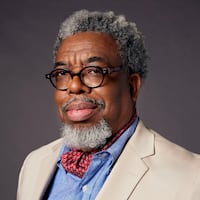In search of role models, some 400 young -- and mostly black --Atlanta entrepreneurs found one Friday in the form of Tyler Perry.
First and foremost, Perry is a movie star and one of Hollywood's most bankable commodities. But Atlanta Mayor Kasim Reed and the White House also noted to the audience that he is at heart a businessman who has created a multi-million-dollar entertainment and philanthropic empire in Atlanta.
“I had heard other aspects of his story, but it was good to hear how hard he worked to get his business off the ground. That was very inspiring to me,” said Jarrod Jordan, executive director of the Vanguard Leadership Group. "Now I am here to learn from others what it takes to run a successful company."
Perry was the keynote speaker at the Atlanta Urban Entrepreneurship Forum, an all-day program at the Woodruff Arts Center co-sponsored by the White House and Reed.
“President [Barack] Obama’s top priorities are creating jobs and providing economic opportunities for all Americans to ensure that we win the future,” said Michael Blake of the White House Office of Public Engagement. “One critical way to achieve that goal is by partnering with visionary leaders such as Mayor Reed to provide local business leaders, especially urban entrepreneurs, with the tools they need for economic success and job growth.”
One of program's highlights was supposed to be the “60-second Pitch,” where entrepreneurs had one minute to convince a panel from the 100 Urban Entrepreneurs that their businesses would work. The winner would receive $10,000 in startup financing and eight weeks of mentoring.
But officials were so moved by some of the pitches that they awarded three $10,000 grants to Lawrence Watkins, Kwanza Fisher and Brittany Earls.
“The future for employment in the United States is not large corporations,” Reed said. “It is in the small and medium-sized business with visions and dreams.”
For Perry, who seldom speaks in public, it was a rare appearance.
“The call came from the mayor and the White House and it was about entrepreneurship,” Perry told The Atlanta Journal-Constitution later. “That made me get off the porch.”
He addressed more than 400 entrepreneurs -- urban minority, women and socio-economically disadvantaged -- who were invited to share strategies and network.
“What you need to know about urban business and urban entrepreneurs is that you have to be as good and a little better than everyone else,” Perry said. “If it is black-owned, it has to be more professional than anything you've ever seen. If you're supposed to be open at 9 a.m., you need to be there at 8:15 a.m.”
Perry, who started out as a playwright, said from 1992, when he moved to Atlanta, until 1998, he was broke and struggling. At times he lived in his car – when he had one -- as he watched play after play flop until he broke through six years later.
“From that night to this very day, I have been selling out arenas all over the country,” said Perry, who has gone on to gross nearly $1 billion in television and movies from his Southwest Atlanta studio.
One more honor might soon be in store. After presenting Perry with a proclamation, Reed said he is prepared to ask the Atlanta City Council to rename Greenbriar Parkway, where his studio is located, to Tyler Perry Parkway.
About the Author
The Latest
Featured


